Peacekeeping missions of the Latin American armed forces
Thirteen Latin American countries are involved in international peacekeeping operations, humanitarian missions or multinational missions to secure the oceans. Frequent deployment locations are Africa and the Middle East. The personnel deployed vary according to the mission, from a handful of observers to company and battalion-sized units including support troops. In line with the operational environment, primarily army troops are deployed, but naval forces are also deployed.
Argentina: Buenos Aires participates in the UN peacekeeping force in Cyprus (two infantry companies plus transport helicopters) and deploys observers to the Sinai Peninsula, the Golan Heights and Western Sahara. Between 1995 and 2004, Argentina also deployed troops to support the NATO-stabilisation mission in Bosnia, and subsequently supported the EUFOR mission there for a time; from 1999, the South Americans also deployed medical troops as part of the NATO-mission in Kosovo.

The Brazilian frigate ConstituiÇÃo was the flagship of the UNIFIL mission in Lebanon (Image: UNIFIL)
Brazil: As the strongest military power in Latin America, Brazil is, as expected, the most active country when it comes to participating in international missions. From 2004 to 2017, Brasilia consistently provided the strongest national contingent of the UN stabilisation mission in Haiti (an infantry battalion and a pioneer company); the multinational contingent, which comprised around 5,000 people, was constantly led by a Brazilian general until the mission ended in 2017.
In order to further increase the country's deployment capacities, the Brazilian army is currently optimising a battalion designed for peacekeeping operations; the unit should be ready for deployment in 2022. Unlike most Latin American countries, Brazil also deploys its navy as part of international operations. Since 2011, the country has deployed a frigate annually to participate in the UN peacekeeping force in Lebanon. A Brazilian rear admiral has already been commodore of the UNIFIL Maritime Task Force several times. The Brazilian military is also active overseas outside of the UN aegis. For example, the navy takes part in the annual Obangame Express exercise in the Gulf of Guinea; the aim of the exercise, which is organised jointly with US, European and African Naval forces The aim of the series of exercises is to promote the operational capability of the countries bordering the Gulf.
Chile: Chile also wants to increase its participation in UN missions. Santiago is currently sending observers to the Golan Heights as well as small groups of around 15 people each to the UN mission in Cyprus and to support the EU mission in Bosnia. From 1995 to 2004, Santiago had already deployed troops to the NATO-stabilisation mission in Bosnia.
El Salvador: San Salvador provides peacekeepers for five UN missions in Africa and the Middle East. The largest contingents were deployed to Mali (around 100 infantrymen and a helicopter squadron) and Lebanon (an infantry platoon).
Guatemala: Guatemala is participating in six UN missions in Africa and Lebanon. The largest contingent is a special forces company in the Democratic Republic of the Congo.
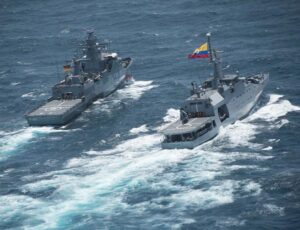
Meeting between the Colombian
7 De Agosto and the German Erfurt during Operation. Atalanta 2015 (Image: Colombian Navy)
Colombia: In August 2015, Bogota provided an offshore patrol vessel (OPV) for the EU-led anti-piracy operation Atalanta and for the NATO-operation Ocean Shield; as part of the deployment in the waters off Somalia, the Colombian Ship ARC "7 de Agosto" with units from the German, Spanish and Danish navies. This was followed in January 2016 by an agreement in principle with the UN regarding possible participation Colombian Armed Forces in peace missions. Bogota sends an infantry battalion to the UN mission on the Sinai Peninsula.
Mexico: Five years ago, Mexico decided to expand its military operations abroad, with a focus on peacekeeping missions. The decision was made to establish a battalion focussed on this with operational readiness from 2021. An operations management centre for humanitarian deployments was established in 2019; the office is to take over the coordination of mixed civilian-military deployment groups and carry out preparatory operational training for the personnel involved. However, due to constitutional restrictions regarding the deployment of troops, Mexico is currently only participating in the UN observer mission in Western Sahara.
Uruguay: Montevideo's military is involved in four UN missions. The largest contingent comprises around 1,200 troops for the stabilisation mission in the Democratic Republic of Congo.
There are also Bolivia, Ecuador, Honduras, Paraguay and Peru. These countries participate with a very small number of observers in UN missions in various, mostly African countries.
NATO Global Partners
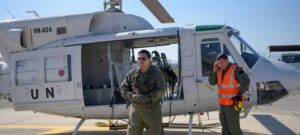
Argentine peacekeepers in Cyprus in 2019. (Image: UN)
As explained above, in the context of peace and security operations in which both Latin American states and NATO-The countries participating in the programme often have the opportunity to cooperate and exchange experiences. Added to this is the fact that most Latin American countries have close training and exercise agreements with the US Armed Forces and Canada. To a lesser extent, there are also joint exercises and training programmes with some European countries, as well as operational cooperation. This takes place, for example, in the area of combating drugs in the Caribbean, in which the UK, France and the Netherlands participate due to their possessions there.
Some Latin American countries are seeking to be recognised as NATO Global Partner. Global partners are states outside the geographical area of responsibility of the alliance that are nevertheless eligible as partners for security policy reasons. The recognition of individual states as global partners was approved at the NATO-summit in Lisbon in 2010. This flexible partnership policy was developed in the following months and formally adopted at the Alliance's Berlin Foreign Ministers' Meeting in April 2011. Selected partner states can now participate in all cooperative activities and exercises of the Alliance. The Alliance can now seek deeper engagement with states in all parts of the world that could make a significant contribution to security. Confidence-building measures, greater transparency, information sharing and deeper practical co-operation with the states concerned will be possible. This will lead, on the one hand, to the expansion of political dialogue on common security interests and, on the other hand, to practical assistance in developing the military capabilities of partners, including their interoperability with the NATO.
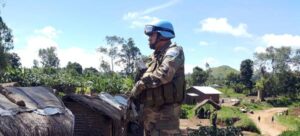
Peacekeepers from Uruguay protect a village in the Democratic Republic of Congo. (Picture: UN)
One objective of the partnership programme is to expand operational cooperation, including the involvement of individual partner countries in NATO-exercises and deployments. According to the NATO-headquarters, the participating states agree with the Alliance on an individually designed cooperation programme and select the areas of activity in which they will actively cooperate with the Alliance. NATO - want to work together for mutual benefit. Most global partner countries actively contribute to NATO-guided operations. As a rule, they are assigned to the NATO-members in terms of operational involvement; this also extends to the involvement of liaison officers in the corresponding planning staffs in the NATO-headquarters. However, cooperation with individual global partners can also be limited to political cooperation. There is no obligation to provide assistance on the part of the NATO nor an obligation on the part of the partners to participate in military operations.
Pioneer Colombia
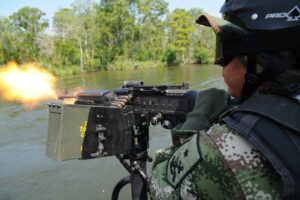
River combat mission in Colombia. (Image: US Navy)
To date, nine countries worldwide enjoy the status of NATO Global Partners. The only Latin American country in this round so far is Colombia. The country's admission to the Global Partners Club was agreed in 2017 after four years of negotiations. The then Colombian President Juan Santos Calderon emphasised the advantages of the "accreditation" in Brussels. He held out the prospect of cooperation in the areas of maritime security, cyber security and the fight against terrorism and international crime. The new status would increase the country's international standing and influence, explained Santos at the end of May 2018 during his visit to the NATO-Headquarters.
Colombia is already reaping practical benefits from the partnership. Joint exercises and training measures promote interoperability with the Alliance and increase the operational capability of the Colombian Armed Forces. Colombian Officers attend courses at the NATO-school in Oberammergau and the NATO Defence College in Rome. The Colombian Ministry of Defence has been involved in the Alliance's Building Integrity Programme since 2013 in order to consolidate the integration of democratic norms such as political accountability and transparency.
On the other hand, the alliance benefits from Colombia's many years of operational experience in the areas of demining, combating improvised explosive devices and fighting insurgents and paramilitary drug cartels in the jungle and at sea. Both sides are currently working out how Colombia can best utilise its specific experience and skills to support the alliance. As a first step, in March 2019 the Columbian International Demining Center (CIDES) was integrated into the network of the NATO-training centres; NATO-This gives staff access to the CIDES training programmes. In the same year, an advanced seminar was set up in Bogota in order to utilise the experience of the Colombian Armed Forces in the fight against piracy and maritime drug smuggling to the partners. The transferability of this operational experience to the fight against terrorism is part of the course.
Other joint approaches that are being pursued include strengthening maritime interoperability and the exchange of information between the Naval forces Colombia and the NATO-The aim of the programme is to promote the protection of civilians, especially women and children, in peacekeeping operations.
NATO 2030
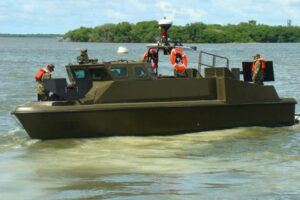
River combat boat type LPR-40 (Image: Cotecmar)
NATOSecretary-General Jens Stoltenberg also holds out the prospect of recognising other Latin American countries as partners. "It is certainly possible to have other partners from Latin America, [but] the request would have to be made explicitly by the Latin American country [and] discussed in detail among the 29 member states," explained Stoltenberg in April 2019. The admission of these states as fully-fledged partners would be a matter of course. NATO-However, due to the geographical restrictions of the NATO-agreement remains out of the question, Stoltenberg said after US President Donald Trump issued a NATO-membership of Brazil.
The Secretary General also recently reiterated the Alliance's willingness to seek additional global partners, albeit without explicitly mentioning Latin America. On 8 June, Stoltenberg presented the initiative NATO 2030. The initiative aims to analyse the security policy and social developments of the coming years and draw conclusions for the interests of the West. Adapting to the new realities, which include economic and military threats as well as pandemics and climate change, also requires a broader global approach, explained Stoltenberg. This global approach should not result in the geographical expansion of the Alliance's military presence, the Secretary General warned. Instead, the focus should be on recognising that the national interests and concerns of nations are interlinked. "As we look towards 2030, we must [work] even more closely with like-minded countries to protect the global rules and institutions that have ensured our security for decades, to develop [timely] norms and rules of behaviour and ultimately to advocate for a world based on freedom and democracy," Stoltenberg explained.
Author: Sidney E. Dean


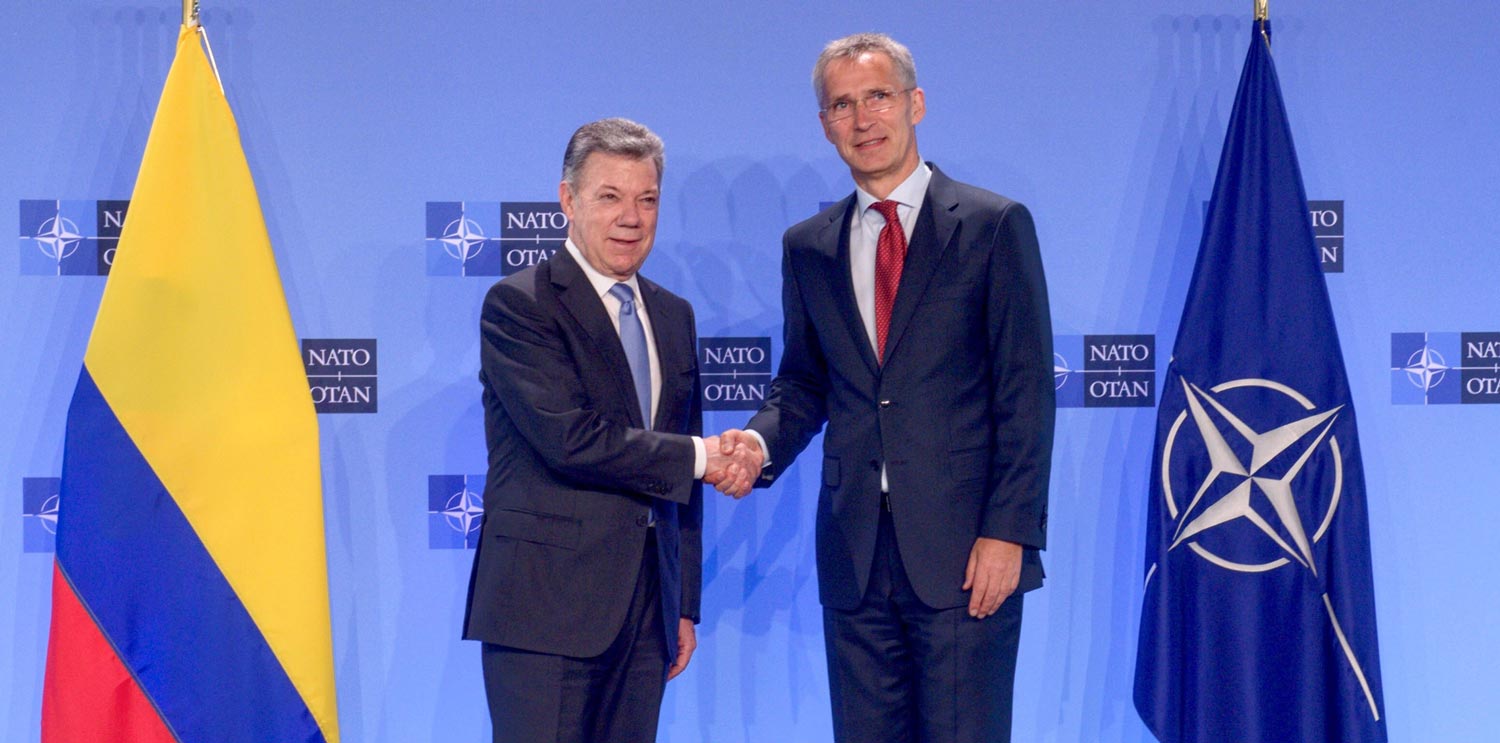








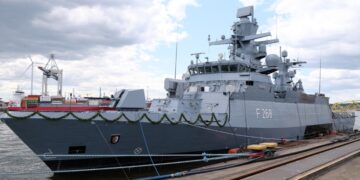
0 Kommentare